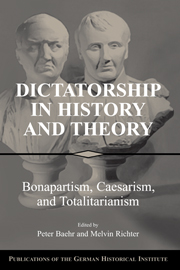Book contents
- Frontmatter
- Introduction
- PART I BONAPARTISM TO ITS CONTEMPORARIES
- 1 From Consulate to Empire: Impetus and Resistance
- 2 The Bonapartes and Germany
- 3 Prussian Conservatives and the Problem Of Bonapartism
- 4 Tocqueville and French Nineteenth-Century Conceptualizations of the Two Bonapartes and Their Empires
- 5 Marx’s Eighteenth Brumaire of Louis Bonaparte: Democracy, Dictatorship, and the Politics of Class Struggle
- 6 Bonapartism as the Progenitor of Democracy: The Paradoxical Case of the French Second Empire
- PART II BONAPARTISM, CAESARISM, TOTALITARIANISM: TWENTIETH-CENTURY EXPERIENCES AND REFLECTIONS
- PART III ANCIENT RESONANCES
- Index
4 - Tocqueville and French Nineteenth-Century Conceptualizations of the Two Bonapartes and Their Empires
Published online by Cambridge University Press: 05 January 2013
- Frontmatter
- Introduction
- PART I BONAPARTISM TO ITS CONTEMPORARIES
- 1 From Consulate to Empire: Impetus and Resistance
- 2 The Bonapartes and Germany
- 3 Prussian Conservatives and the Problem Of Bonapartism
- 4 Tocqueville and French Nineteenth-Century Conceptualizations of the Two Bonapartes and Their Empires
- 5 Marx’s Eighteenth Brumaire of Louis Bonaparte: Democracy, Dictatorship, and the Politics of Class Struggle
- 6 Bonapartism as the Progenitor of Democracy: The Paradoxical Case of the French Second Empire
- PART II BONAPARTISM, CAESARISM, TOTALITARIANISM: TWENTIETH-CENTURY EXPERIENCES AND REFLECTIONS
- PART III ANCIENT RESONANCES
- Index
Summary
Much has been written about Tocqueville's concept of liberty. But how did he conceptualize the types of regime most threatening to liberty in societies of the sort (état social démocratique) he declared inevitable? While some important answers have been offered, they are limited to De la Démocratie en Amérique, which tends to be treated as though there were no subsequent developments in Tocqueville's concept of democratic or administrative despotism. Nor has there been critical analysis of the ambiguities, shifts, and varied applications of this concept, as Tocqueville used it throughout his life. For despite his cogent criticisms of “despotism” and “tyranny” as classifications of modern regimes, Tocqueville nevertheless retained these terms when he dealt with those regimes systematically denying political liberty. To understand the concept as employed in Tocqueville's thought, his formulations of it must be located both within his texts and considered in relation to his experience within the three decades of his career as political theorist, politician, and historian. Tocqueville never stopped analyzing how the regimes founded first by Napoleon and then Louis Bonaparte were related to those concepts which dominated his thought: democracy, revolution, centralization, liberty, and equality.
After many vacillations, Tocqueville diagnosed the two Bonapartes, their coups d'etat, and their empires as distinctively modern, as post-revolutionary and post-democratic. He emphasized the unacknowledged paradox that from the two French Revolutions of 1789 and 1848, the greatest hitherto known, had emerged not emancipation, but a regime considerably more repressive than the monarchies that had been overthrown.
- Type
- Chapter
- Information
- Dictatorship in History and TheoryBonapartism, Caesarism, and Totalitarianism, pp. 83 - 102Publisher: Cambridge University PressPrint publication year: 2004
- 2
- Cited by

